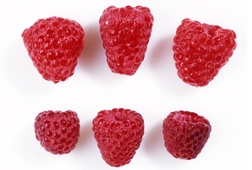This page has been archived and is being provided for reference purposes only. The page is no longer being updated, and therefore, links on the page may be invalid.
|
|
Precise Irrigation Could Boost Raspberry Health, Production
By Laura McGinnisMay 16, 2007
Where is the best place to water raspberries—from above ground or below? That's a persistent question for berry growers throughout the Pacific Northwest.
About 80 percent of the nation's raspberries are grown in California, Oregon and Washington, and irrigation methods tend to vary regionally. But are growers choosing the best watering methods to maximize their plants' growth, yield potential and general health? New research from Agricultural Research Service (ARS) scientists aims to answer that question.
Plant physiologist David Bryla and his colleagues in the ARS Horticultural Crops Research Unit, Corvallis, Ore., are examining two irrigation methods to evaluate how each affects raspberry plants' yield and susceptibility to root rot. Improved irrigation methods could reduce the disease's frequency and severity, with major benefits for plant health and fruit production.
The scientists planted Meeker and Coho plants and watered them via overhead sprinklers or subsurface drips. They also applied varying amounts of water to different plants in order to observe the effects of over- and under-watering.
Results showed that the amount of water received affected berry yield more than the way the water was delivered. Neither irrigation method had a significant effect on yield. The sprinkler system produced more fruit-bearing canes, called floricanes, per plant and more berries per cane, but the berries were smaller, particularly on insufficiently irrigated plants.
In addition to producing larger fruit, drip irrigation considerably reduced the amount of water required. The scientists found no root rot in either cultivar.
It's worth noting that the study was conducted during the plants' first year of production, and that results may differ in older plants. Further testing will determine how mature plants respond to the same watering conditions. The scientists will also adjust the irrigation schedule, applying water more liberally before harvest, to more closely mirror a typical growing environment.
The results of this study could help raspberry growers throughout the Pacific Northwest make better informed management decisions to promote the health and productivity of their crops.
ARS is the chief in-house scientific research agency for the U.S. Department of Agriculture.

